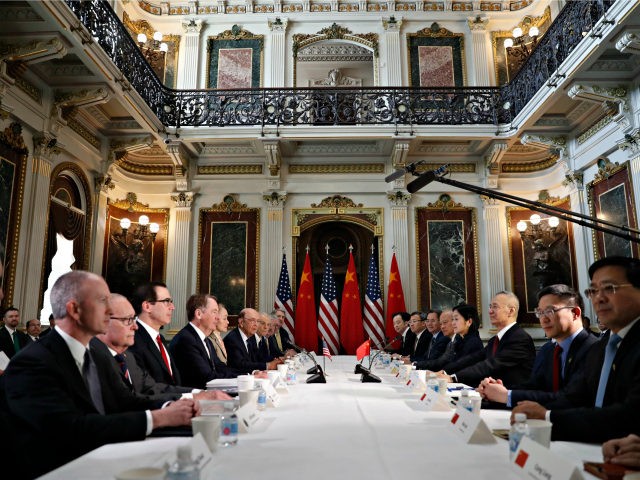China said on Monday that a delegation is still preparing to go to the United States for trade talks, but officials vowed that the Asian nation would not give in to pressure from President Donald Trump.
Donald Trump announced Sunday that tariffs on $200 billion of Chinese goods would more than double, rising to 25 percent from their current 10 percent. He also said the 25-percent tariff would be applied “shortly,” with the remaining $325 billion of goods from China not yet subject to import duties.
This set off speculation that China could pull out of plans to send trade negotiators to the U.S. this week for what had been billed as a penultimate round of talks that would set the stage for a deal to be finalized in talks between Trump and Chinese leader Xi Jinping.
On Monday, Geng Shuang, a spokesperson for China’s Foreign Ministry, did not address the tariffs directly but said China was still preparing to send a trade delegation.
China is, however, considering canceling the talks, according to a Reuters report citing “a person briefed on the matter” as well as a story in the Wall Street Journal.
“China shouldn’t negotiate with a gun pointed to its head,” the person said.
An article published Monday in the Global Times, the Chinese nationalist newspaper controlled by its ruling Communist Party, said that Trump’s tweets would not succeed in getting China to change its position on issues that have apparently led to an impasse in the trade talks.
“Analysts said China’s markedly controlled response to what some called ‘blackmail-style tactics’ from the US also underscored the country’s firm stance and growing confidence in dealing with a volatile and unpredictable US administration, and that China is unlikely to give in to pressure,” the Global Times reported.
The Global Times described Geng’s reassurance that China was still preparing to send a delegation as a “subtle message” that “conveyed a powerful message”:
He said that China has seen similar threats of tariffs on Chinese goods many times before and that the Chinese side’s stance and attitude has always been very clear. “The US is also well aware of that too,” he said.
“[This is saying] that we know what you are trying to do but it will not change our stance,” Bai Ming, deputy director of the Ministry of Commerce’s International Market Research Institute, told the Global Times on Monday, pointing out that the move is a typical US negotiation tactic. “But the US should know by now that China will never give in to pressure.”
Chinese media outlets have been told not to independently report on Trump’s tweets, according to Reuters. The Global Times reported the Chinese response but did not quote from the U.S. president’s tweets.
The apparent breakdown was foreshadowed by a May 2 article in the Global Times that reported the U.S. and China may “have hit an impasse in the tough talks.” That seemed to contradict statements from the Trump administration hinting that a deal could be reached by the end of this week.
Trump’s tweets indicated that China was attempting to renegotiate some issues that the U.S. believed had already been agreed to. Neither the White House nor China have provided details about what those issues might be.
One likely stumbling block to a deal is what officials have referred to as “the enforcement mechanism.” Vice President Mike Pence said last week that the enforcement mechanism would be key to the decision on whether to remove tariffs imposed last year.
Commerce Secretary Wilbur Ross said in March that the U.S. wanted the ability to unilaterally reimpose tariffs if it believes China is not living up to the agreement. China would agree not to retaliate or seek redress in international bodies such as the World Trade Organization.
“We have to have an automatic ability to do something about it,” Ross said, speaking of China “cheating” on trade rules. “You’d be amazed at how having a unilateral ability to mete out punishment modifies behavior.”
A month ago, Treasury Secretary Steven Mnuchin said that China had agreed to an enforcement mechanism. He did not, however, offer specifics about the mechanism.
Some in China view this as going too far and worry that it would be perceived as a sign of Chinese weakness, according to people familiar with the matter.
China also wants the current U.S. tariffs removed immediately. U.S. Trade Representative Robert Lighthizer has pushed back against these demands, arguing that the removal of tariffs should only come when China shows evidence of changing its economic policies in compliance with the agreement.

COMMENTS
Please let us know if you're having issues with commenting.